Panama Leaves China’s Belt and Road Initiative
- Gabriele Iuvinale
- 10 feb
- Tempo di lettura: 3 min
On Feb. 3, Panama announced its plans to leave China’s Belt and Road Initiative (BRI). Panamanian President Jose Raul Mulino announced his decision following a meeting with U.S. Secretary of State Marco Rubio during Rubio’s first official visit as secretary.

Secretary Rubio’s visit to Latin America is set to advance U.S. President Donald Trump’s “America First” foreign policy, discuss U.S. concerns about the Panama Canal, Trump’s immigration policy and plans to counter China and deepen economic partnerships in the region.
Chinese President Xi Jinping established BRI to increase China’s economic growth, spread its influence globally and fund infrastructure projects in countries with natural resources of interest. While Panama officially joined the BRI in November 2017, Chinese access to the Panama Canal dates back to 1997 when Panama and Hong Kong signed a contract to operate two ports, Balboa and Cristobal.
Panama’s membership in BRI and Chinese influence and operations in ports led President Trump and the U.S. Congress to question the neutrality of the Panama Canal and the nature of Panamanian ties to China. This also sparked President Trump’s interest to “take back” the Panama Canal. However, under the Panama Canal Treaties, Panama enjoys sole ownership of the canal, and reportedly President Mulino refused to discuss the canal during Secretary Rubio’s visit.
Secretary Rubio was in Panama as part of his first official visit as secretary of state with other stops in Guatemala, El Salvador, Costa Rica and the Dominican Republic.
Panama Looks to Decrease Its Ties to China
Panama announced its decision to not renew its BRI membership and review its contract with Hutchinson Ports PCC after meeting with the U.S. secretary of state. Secretary Rubio expressed concern about the potential for the Chinese Communist Party’s malign influence in Panama through its operation of the ports and access to the Panama Canal. He added that the United States would impose “necessary measures” on Panama if it did not reduce Chinese involvement in the Panama Canal. Secretary Rubio also reported to President Trump that China’s presence in the Panama Canal violates the neutrality clause in the Panama Canal Treaties.
Instead, Secretary Rubio claimed that reducing Chinese influence in Panama would provide greater opportunities for a reinvigorated strategic relationship between the United States and Panama, as well as provide an opportunity for deeper U.S. investment in the country.
Hutchinson Ports first signed concessions with Panama in 1997 to operate the Balboa and Cristobal ports, and, in 2021, it renewed the contract with Panama until 2047. On Feb. 3, two attorneys filed suit against the Hutchinson contract, claiming it violates a clause in Panama’s constitution that guarantees placing public good over private interests. Hutchinson’s contract cedes Panamanian land to the company to operate the ports and provides large tax benefits. The suit argues that these provisions of the contract particularly violate Panama’s constitution and could provide Panama the opportunity to end the contract before it expires in 2047. If the suit is successful, it would allow Panama to remove Hutchinson from the Balboa and Cristobal ports and decrease U.S. concern about the neutrality of the canal.
Opportunities for U.S. Investment
Following Secretary Rubio’s visit, President Mulino said he is interested and willing to work with the Trump administration to increase U.S. investment and infrastructure projects in Panama and cooperate on President Trump’s immigration policy.
The Trump administration’s “America First” foreign policy prioritizes deal-making to advance policy interests, and Secretary Rubio’s visit highlights the effectiveness of the strategy. Panama’s decision also provides multiple opportunities for U.S. companies to invest in Panama and help diversify the country’s economy and canal revenues. If Panama terminates the contract with Hutchinson Ports, it also provides an opportunity for a new manager of the Balboa and Cristobal ports.
We expect Secretary Rubio’s visit and Panama’s subsequent decision to reduce ties with China to create similar opportunities for U.S.-Panama relations, specifically to support supply chains, critical mineral extraction and other activities related to the Panama Canal. Moreover, the success of his visit portends that future engagements will follow a similar approach with other countries and partners.
[Wiew sourse]

Comments